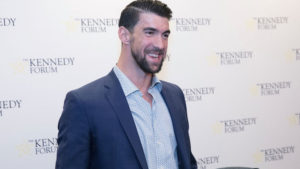Los Angeles Chargers starting right tackle Joe Barksdale was profiled by the Los Angles Times. He discussed his battles with severe depression, his therapy and how he hopes to be an advocate for people suffering from chronic depression.
By Dan Woike
The thoughts Joe Barksdale had wrestled with for as long as he could remember started to get louder.
“Just kill yourself. Just do it. What’s the point of living if you’re going to be this miserable the rest of your life? Just kill yourself.”
It was early November 2017 and Barksdale, the Chargers’ starting right tackle, sat in the team’s training room. He’d just found out he wouldn’t be playing in an upcoming game against Jacksonville after injuring his foot during a fight with a teammate.
“If I could save another person, maybe that’s why the attempts [to harm himself] didn’t work,” — Joe Barksdale
He’d missed the previous two games with a toe injury that had been bothering him for more than a month. Now, he was going to be out again.
He cried.
His severe depression — something Barksdale calls the “monkey” always on his back — had gotten the best of him. Truth didn’t matter anymore. Only sadness did.
He got home and sharpened a knife, his mind racing. His wife, Brionna, convinced him to put it down. They talked, he calmed, and the crisis was averted.
Barksdale, who is on medication and in therapy, is sharing his story in the hopes of becoming an advocate for people suffering from chronic depression.
“If I could save another person, maybe that’s why the attempts [to harm himself] didn’t work,” he said.
During a wide-ranging interview with The Times, Barksdale, 29, said he was physically, emotionally and sexually abused as a child.
He hesitated to talk about the abuse at first before deciding to share his experience. “I was molested when I was younger,” he said. “It happened.”
It was the beginning of childhood filled with insecurities and anxieties.
He felt like a burden because of his size. He was expensive to clothe and feed. He was more interested in engineering than he was in sports. Older kids in inner-city Detroit picked on him.
“Everything that’s happened to me going forward has just piled onto it,” he said. “It’s not going away. They’re like tattoos.”
As he continued to fight a sadness he knew would stay with him, Barksdale found one way to feel better.
Less than four years after learning how to play guitar — at former coach Jeff Fisher’s suggestion — Barksdale just released his debut album, “Butterflies, Rainbows & Moonbeams.”
“If he was stressed out, where some people might go and smoke a cigarette or something, he’d go and pick up his guitar,” Brionna said. “His guitar was his outlet, and once he started writing music it was even better because he could get those thoughts and feelings out in words and music.”
Brionna wrote the lyrics to the most personal song on the album, “Journey to Nowhere,” after a tough night for Barksdale due to his depression.
Read the rest of the story on LATimes.com.


 By
By 





